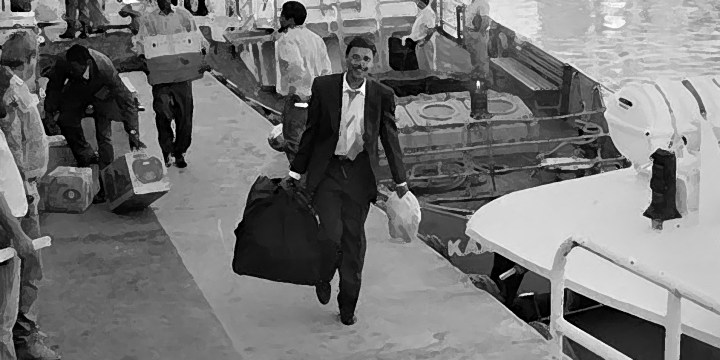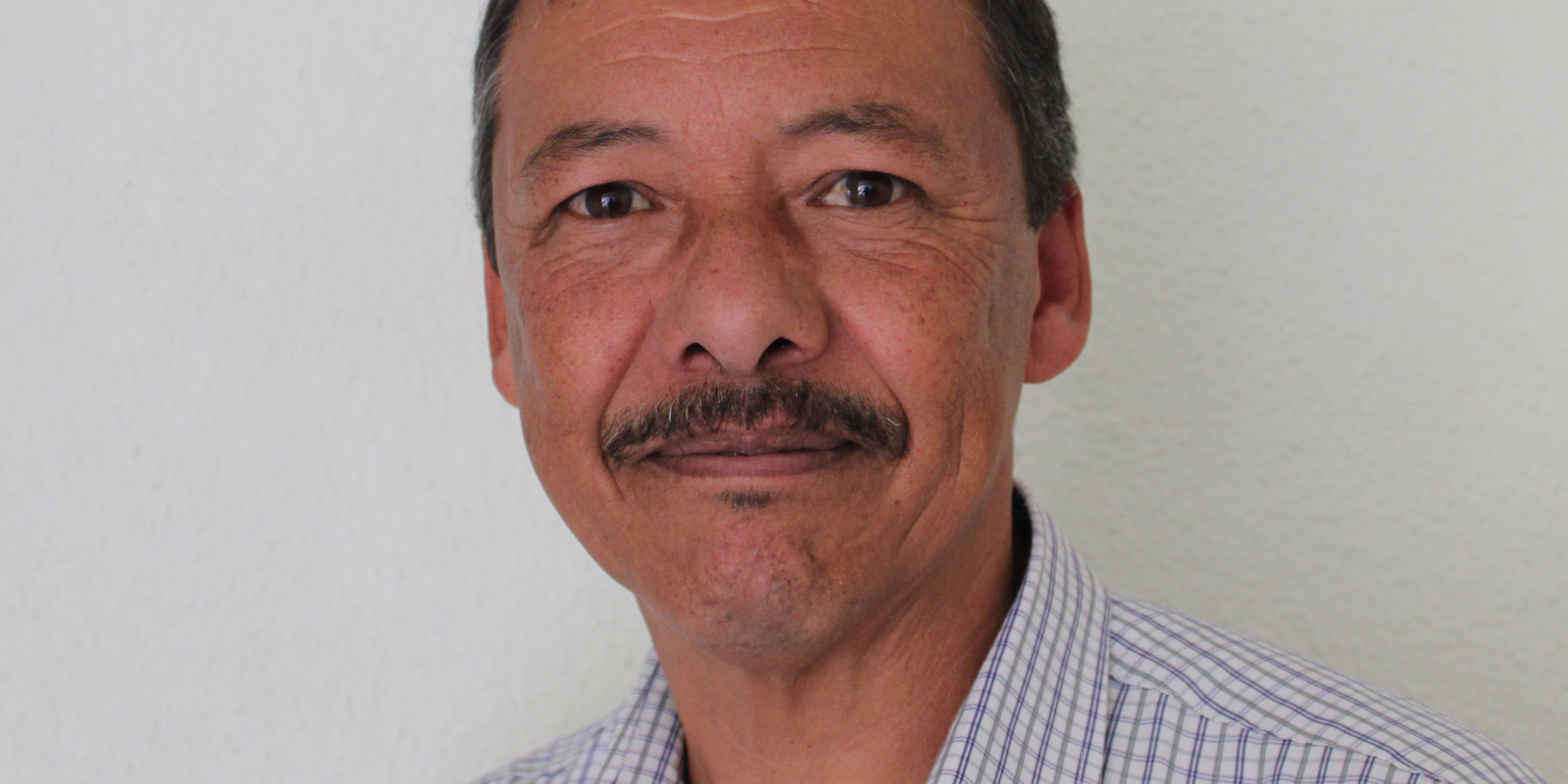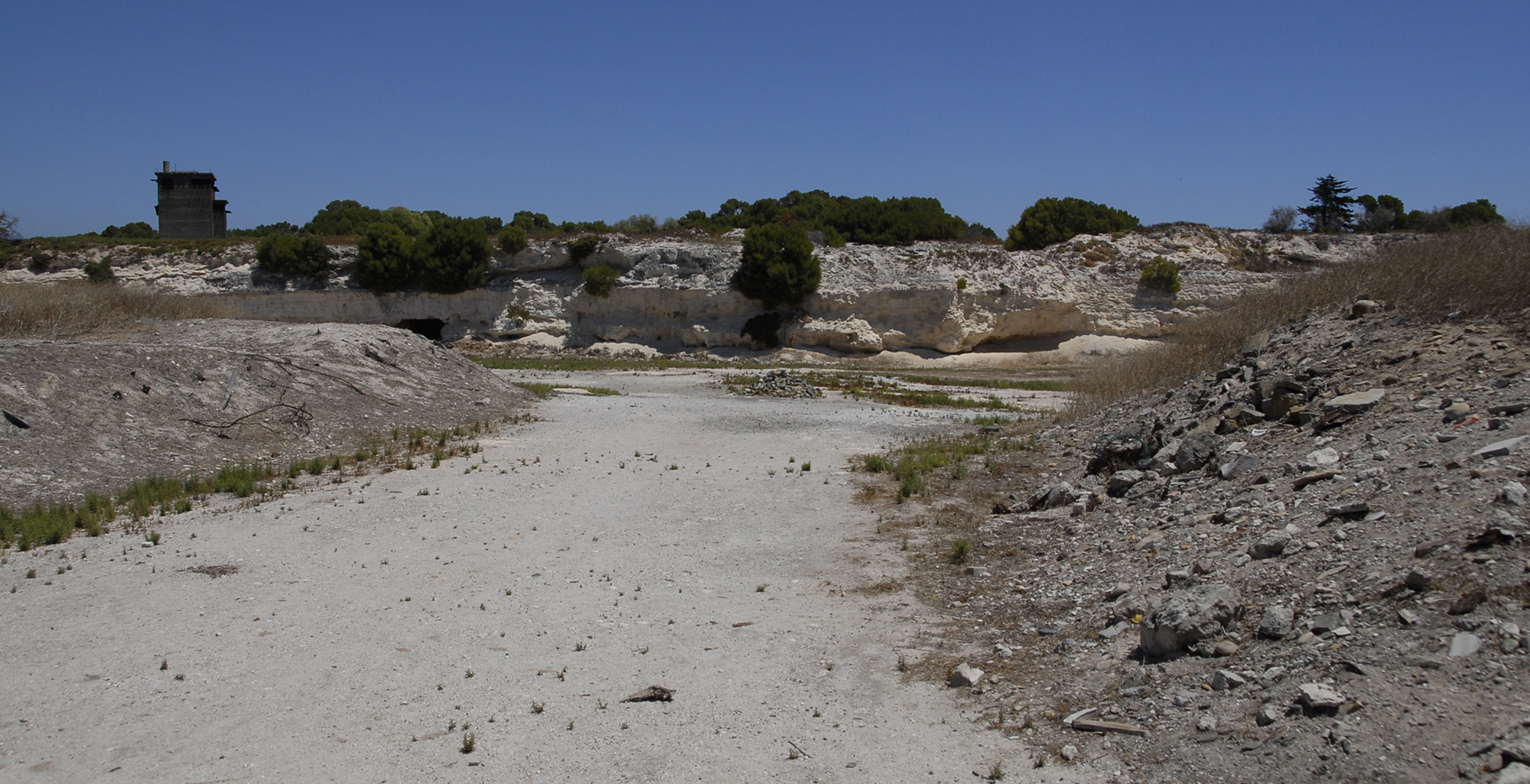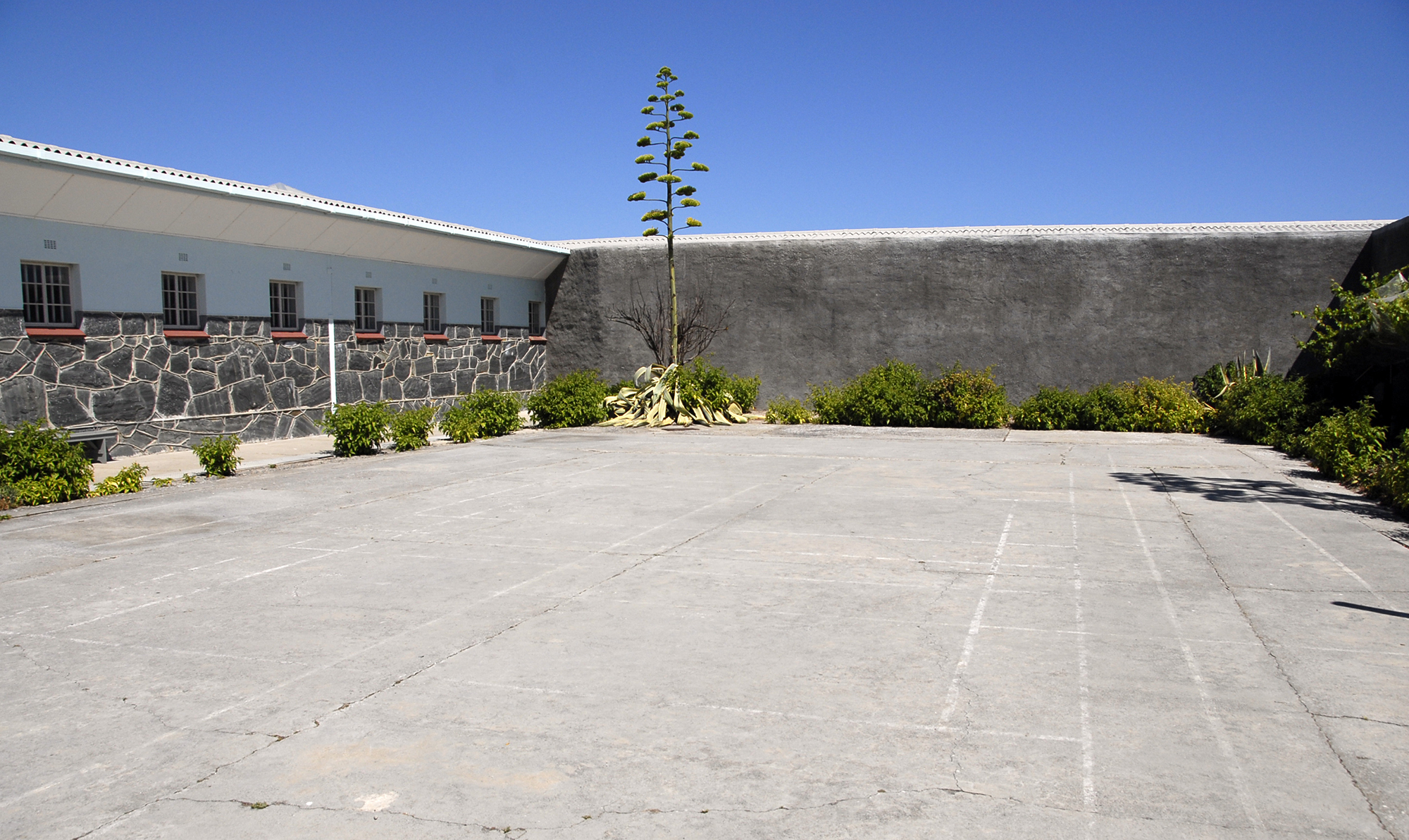LOCKDOWN REFLECTION
Covid-19: Like my time on Robben Island, this too shall come to pass

uMkhonto we Sizwe commander Ashley Forbes was just 24 when, on 14 December 1988, he was sentenced to 15 years imprisonment on Robben Island after being convicted under section 29 of the Internal Security Act. The trial lasted 65 days, and during his detention, Forbes was tortured by notorious security policeman, Warrant Officer Jeff Benzien, who would practice a form of waterboarding on the prisoners. Here, Forbes reflects on Covid-19, lockdown, and his time on Robben Island.
Locked Down
I watched as the virus spread from China in December 2019, to the Western world in January/February 2020, to our shores with the first confirmed cases of Covid-19 in KwaZulu-Natal on 5 March 2020, the unprecedented declaration of a State of Disaster by President Cyril Ramaphosa on 15 March 2020 and the “hard lockdown” on 27 March 2020. The world it seems is forever changed. The catastrophic impact on what was a normal human existence is gone and what is supposed to be abnormal is becoming normal.
It is clear that it will stand us in good stead going into the future if we voluntarily and consciously embrace the new reality of practising good hygiene habits, being aware of the surfaces we touch, wearing masks as a symbol of respect towards others, avoiding shaking hands and physical contact, maintaining good distances between ourselves and others, avoiding large gatherings and crowds, while remaining socially conscious and spending as much time as possible with our family at home.

Ashley greets family and friends on the day of his release at Cape Town Harbour. (Source: The Scientific Electronic Library Online)

Ashley Forbes. (Photo supplied)
President Ramaphosa has lifted the 35-day “hard” lockdown and moved the country from Level 5 to Level 4 as of 1 May 2020. The primary income-generating industries like mining, finance, fisheries, manufacturing and some imports and exports have been given limited operating rights. The international community has lauded South Africa for its quick response and hard lockdown, the measured lifting of the lockdown and the flattening of the curve that provides our country with the much-needed space to prepare for war.
Our country stands at the edge of a precipice where waves of infections and deaths are predicted to hit our beautiful shores in the months to come. Our health systems will be overrun, as has been the case in most “First World” developed economies. This time there is no Madiba Magic to save us. Our people will suffer and I cannot imagine the pain and destruction that lies ahead.

Limestone Quarry, Robben Island, South Africa. (Photo: Gallo Images)
What I can say is that our people will emerge from the ashes stronger, transformed and poised for the new normal. We are resilient, creative and colourful and I cannot imagine going into battle with any other. Our unity, innovation and good humour have been heartwarming to behold as we prepare for what will undoubtedly be one of the gravest human tragedies that will befall our glorious nation.
Isolation and limiting social contact has by far been the most successful strategy that the world has against this unseen enemy, and while Covid-19 may come and go, our new abnormal will forever shape the future of our world in ways we cannot imagine. While there are undoubtedly many political, economic and social lessons to be learnt, we cannot ignore the profound impact that isolation and physical distancing is having on our psyches, and how we as social beings are struggling to adapt to the new reality.
Locked Up
I was in my second year studying Physical Education at the University of the Western Cape in 1986 when I went into exile to escape arrest by the apartheid government and was instructed to go for military training in Angola. Within three years I had completed my training, returned home, was arrested for terrorism, went through a year-long trial in the Supreme Court and was sentenced to 15 years imprisonment.

Courtyard tennis court, Robben Island, South Africa. (Photo: Gallo Images / Rubu Soho)
Robben Island had been used as a prison from the time the Dutch colonised the Cape in 1652. It was later used as a leper colony and a lunatic asylum. Much of the current infrastructure like houses, roads, military observation posts and batteries was built during the Second World War when it was used as one of the strategic naval bases along our coast.
My co-accused and I were en route to experiencing the strictest form of incarceration the apartheid state could devise. Their plan was to break our will and shatter our dreams for a better world.
The warders tell us to pack up our things. We go from Pollsmoor prison in “rumaan” trucks to jetty 1, a dreary light blue double-storey building at the end of a derelict section of jetties in the V&A Waterfront.
From the cells in the building, we go through a single door, down a narrow brick ramp onto the quay and down into the hull of the Mv Dias, named after the Portuguese explorer Bartolomeu Dias, who first sailed around our coast in February 1488.
Very few of us had ever set foot on a boat, let alone gone out to sea. It is when you feel the vessel pull away from the quayside that you know you are going to Robben Island prison. We sit down, wearing leg irons, in a small locked section in the hull. There are no windows. We sit on benches facing each other. Nobody gets terribly seasick as the single hull metal vessel pitches and rolls during the 45-minute, 12km crossing to the island.
After the vessel bangs up against the quayside on Robben Island, we find ourselves disembarking to the screams of warders who move us along quickly. We walk up the quay that is lined with a high wall blocking our view of Cape Town and the mountain. We go through an arch with the prison logo painted overhead and up a short road to the slate-covered prison complex. At the top of the tapering slate-covered stairs are the big grey double doors of the prison.
When I go through these doors I know I will only exit them in 15 years – there is no possibility of parole or early release. The warder bangs on the doors and shouts, “Dankie hek!” A single metal door opens onto a small grey reception area. The door bangs shut and the warders search us, sign in our personal possessions through a small square hole in the wall and lead us through another set of doors down a passage that passes the entrances to B-Section and the hospital section, to the entrance of C-Section.
We file through the side door of the isolation section and I sneak a wave at a guy standing in the distance. We move into the section with single cells that have thick steel mesh on the inside of the barred windows that allow very little light in. I wonder if that guy saw me and my friends laugh and tell me that I had just greeted a wooden carving of an African man.
We spend a few weeks in the isolation, or punishment, section where we are observed and screened. If we were to ever dare defy the authorities, this is where we would end up, on spare diet, in total isolation and hidden from the general prison population. We are then moved to the adjoining A-Section for a few weeks. There are many more single cells with no mesh over the windows and a bigger dining room area and outside courtyard. Eventually, my co-accused get moved to D-Section, which has four big communal cells and a football field. I get moved to B-Section, which has two long rows of single cells and a courtyard the size of a tennis court.
When I first set foot in B-Section, with the warder banging the iron door behind me, I see a solitary figure coming up the passage to meet me. He looks me square in the eye and asks, “Chiefs or Pirates?” I say, “Pirates”, and for a moment I can’t read anything in his expression. He smiles, puts his arm around my shoulder, introduces himself as Peter Paul Ngwenya and walks me down the passage to introduce me to the comrades. He tells everyone that I support Pirates, the Buccaneers who “work hard, win easy”. As I bed down for the night in my grey 2×2.5m cell I feel as though I have come to the end of the road.
The day starts in the way all days in prison do, with the clanging of big keys slamming into metal locks and the banging of metal doors as the warders open one after the other. We emerge into the passage where we go down to the bathrooms to empty our buckets. Our single cells do not have toilets so we use metal buckets that are kept in our cells at night. The buckets are cleaned in the mornings and left outside in the sun to dry.
What quickly becomes apparent as I linger in the sunshine is that there is a rigid routine and that it is voluntary and self-imposed. Apart from only seeing the warders when a door is opened or closed for meals or exercise, the prisoners themselves structure what is left of the day and night. This way of doing things has evolved over decades, with each generation of political prisoners having contributed to its ultimate design.
There is a highly centralised and clandestine leadership structure that includes members from all sections and that influences all activities. Political discussions, usually along political lines, are held at least once a week. Discussion documents and articles are written in a tiny font, often on long strips of toilet paper and smuggled between sections for discussion. Everyone is encouraged to study and register for correspondence courses that are allowed by the authorities. Prisoner classes and group discussions provide support.
You are encouraged to keep your cell clean, while all communal areas such as the passages, dining rooms, bathrooms and outside spaces are cleaned by work “spans” of comrades who rotate their duties among the four areas on a weekly basis. Bra Zee is a ‘timer’ and a character in D-Section who everyone must go through to get their prison wear. Over the years, prisoners have managed to bring in sporting equipment for all sections and the biggest highlight on the prisoner calendar is the annual ‘summer games’ where all sections get an opportunity to interact and compete against each other. Connections are made, talent is discovered, matches are verbally replayed throughout the year and grudges are firmly held till the next year’s games.
Word soon spread that the predominantly young and newly arrived comrades in D-Section had low morale and were not very productive. Mosiuoa “Terror” Lekota from B-Section got permission from the authorities to go to D-Section on a daily basis for a short time to assist. It was in the best interests of the prison authorities that prisoners did not suffer from low morale or sit around idly all day. Good reports came in through the grapevine as Terror, who was a ball of energy, motivated comrades to fix their walkways, start vegetable gardens and clear their grounds of vegetation and debris.
On one occasion when I went with Terror to D-Section to work, I got a once-in-a-lifetime opportunity to leave the prison complex in a truck to offload vegetation at the dumpsite at the back of the island. I heard reports that some warders allowed the comrades to take shellfish from the rocks when they went to the dumpsite.
It was not long before the section was abuzz with activity as the comrades embraced the idea of managing their own lives. This was important as it meant the prison system with all its might could not break us. We determined our destiny even from within the bowels of the apartheid state.
On one of the rare occasions that I was in D-Section, I spent some time talking to Cecyl Esau, one of my co-accused. We were sitting with our backs against the brick wall that divided D-Section and C-Section. I did something that I still cannot believe I did. We heard that a newly arrived ANC comrade was being held in C-Section for observation. Without much thought I scaled the wall and jumped into C-Section. I found a man I came to know as Rafiq Rohan and quickly tried to explain the process of how he would be moved from the isolation section to the general sections.
Social distancing in some form or another, and proactive measures to combat the ever-present threat of viruses and disease, will forever be uppermost in our minds as we shape our new social, environmental, economic and political order.
When I asked about the burns on his body and why he was in prison, he recounted how he had accidentally pulled a pot of boiling water over his body when he was young. The water burnt his face, neck, arms and body and had fused his fingers. He had to endure many skin grafts, missed out on years of school work, had to deal with people’s attitudes and had to adjust to a new face.
Rafiq was a news editor at the Natal Post and an MK combatant convicted of 29 counts of terrorism. He was sentenced in April 1990 to 15 years imprisonment. He recounted how on 7 April 1989 he had placed a limpet mine at the CR Swart Square police station in Durban. As he drove out of the complex two policemen spotted him and gave chase. He sped through a series of red robots and down Stamford Hill Road with police firing at him. Bullets shattered his car windows. In Ordinance Road he crashed into the back of a vehicle and spun off the road. He got out and ran into the nearby bush where he realised that he had been shot. He was running on the stump of his leg with his foot dragging to the side. He found a ditch and covered himself with vegetation. He could see the lights of the police vans taking up positions and he could hear the lines of policemen and barking dogs systematically scouring the bushy area. A dog stepped over him and he heard the police move on past.
As the sun went down he could see a solitary police van slowly circling the field. He lay in the ditch oozing blood, in unbearable pain, wondering if he would survive the night. With his body going into shock he dug himself out of the ditch and dragged his broken body into a clearing where he could wave down the van. The security police arrived shortly afterwards to bundle him into their vehicle.
Instead of going directly to a hospital, they started their interrogation. They prodded at his wounds while demanding to know who else was involved in the attack and where the other explosives were. Days later, as he lay in his cell waiting for the horror of the next day, he decided to commit suicide.
I cannot imagine what went through his mind, but he tightened his shirt around his neck, tied the other end to the bars of the window and jumped. The material stretched as he slowly descended to the ground choking ever so slowly until his toes reached the ground to support his weight. He stayed there choking, unable to move, get loose or die. He called out to the warders who cut him free.
I don’t know why, but I could not stop giggling and trying to explain to Rafiq just made things worse. Suicide was also my chosen method as I too had tried to take my own life while being held under Section 29. I scaled the wall and returned to our section where I went about my business smiling inside, somewhat inspired.
The only person who could leave our section every morning and go to other sections was comrade Elias Motsoaledi. He was a short, quiet, even solitary person, and a legend. He arrived in the 1960s with the Rivonia trialists and dedicated his life to maintaining the most beautiful gardens in the prison. The courtyard of B-Section was rectangular in shape with a green tennis court with white lines painted over the entire concrete surface. A border of colourful vygies blossomed along the long sides of the court and a patch of flowers with benches lined the top end. Comrade X, who was also a timer, was the only person privileged enough to have a small patch in the corner of this space where he grew varieties of dense, tall chili trees. He often joked at how Elias had 87% of the land while everyone else had to make do with 13%.
I was young and active and didn’t have much time for flowers, apart from the odd occasion when I was thrilled to take a small flower to my loved ones on visits. But like so many of us, we would have preferred to grow some food. After many appeals and lobbying, we failed to change the status quo and quickly realised how important this unassuming man was. Part of the reason I came to learn so much, was the fact that he was instrumental in the smuggling of information to the various sections in the prison.
In 1991, political prisoners were slowly released from prison to gauge the reaction of the oppressed masses, and it was done on the basis of “first in, first out”. Comrade Elias Motsoaledi was one of the first to be released and the whole prison heard the big front doors bang as he was released from prison. With the sound still ringing in our ears, we went in silence to the flowerbeds at the top end of the tennis court and ripped out all the flowers except for a small apple tree. The area was flattened and divided into five where I farmed spinach on my stake of land.
Ebrahim Ebrahim, who was sentenced to 15 years on Robben Island – and who was released and then returned to serve another 15 years – was less active in his garden duties so I maintained his plot for him and grew tomatoes. Every evening comrade Elias used to collect the used tea bags in the section to brew a tea fertiliser in two-litre bottles which he distributed among all the flower beds in the prison. He did this diligently for decades and when we harvested our first healthy organic produce, we could not help remembering the great people who had gone before, fertilising the land to allow us to benefit from the sweat of their labour.
Release
Let go of the past. It is gone forever. We will reminisce and talk fondly about the good old days, but they will never come back. The world has moved on. The very nature of our being has been transformed. We know where we come from, but we must embrace the future. It is new, scary, exciting but we are wiser and stronger and better able to navigate this world. We draw on the wealth of experience of our forefathers and we build on their legacy to shape our new world.
Social distancing in some form or another, and proactive measures to combat the ever-present threat of viruses and disease, will forever be uppermost in our minds as we shape our new social, environmental, economic and political order.
If someone were to ask me if our country will survive the fast-approaching storm? I will draw comfort in having had a glimpse at the immense power of the human spirit. In the darkest of days, we claw our way out, when everything is stacked against us, we organise and thrive, and when everything is lost we innovate and bring beauty and light into the world. DM
Ashley Forbes became active in student organisations while at high school, and was active in the establishment of the United Democratic Front in 1983. He later joined uMkhonto we Sizwe, the military wing of the ANC. He went into exile in 1986 and completed his military training in Angola. After his release from Robben Island in 1991 he completed a three-year Business Management diploma in Singapore. He assisted with the establishment of the Robben Island Museum and returned to the island in an act of unintended irony to take up the position of Estates and Services Manager. He is currently a fundraiser for a variety of NPOs in Cape Town.
"Information pertaining to Covid-19, vaccines, how to control the spread of the virus and potential treatments is ever-changing. Under the South African Disaster Management Act Regulation 11(5)(c) it is prohibited to publish information through any medium with the intention to deceive people on government measures to address COVID-19. We are therefore disabling the comment section on this article in order to protect both the commenting member and ourselves from potential liability. Should you have additional information that you think we should know, please email [email protected]"





 Become an Insider
Become an Insider